The fish thrashed madly in the heron’s bill. The bird loosened its grip and lost the fish, but a quick stab and the Great Blue had it again. The bird beat the fish against the water, flipped it in the air, caught it head-first, then tipped its bill skyward and started the laborious process of swallowing the catfish whole. The walkers on the trail that curved around the small bay let out a sotto voce cheer.
Only the fins were visible when the heron gagged and the fish was in the water again. The bird nabbed its wriggling dinner and cocked its head, considering its options.
Bread Upon the Waters
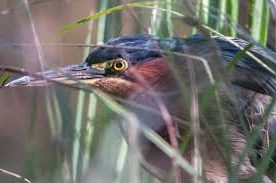 A famous YouTube video shows a Green Heron progressively luring a fish into the shallows with a piece of bread: the fish goes for the bait, but again and again, the heron snatches it away, until the fish rises fully to the surface and the heron makes its catch, strutting down the beach to bash its dinner against the stones.
A famous YouTube video shows a Green Heron progressively luring a fish into the shallows with a piece of bread: the fish goes for the bait, but again and again, the heron snatches it away, until the fish rises fully to the surface and the heron makes its catch, strutting down the beach to bash its dinner against the stones.
Other Green Herons have been seen catching a dragonfly, flying to a pond and laying the dragonfly on a lily pad to lure a fish to the surface.
Twelve bird species use “bait” to catch fish. Seven of those are herons that hang out where humans fish with bait or cast bread to entice fish to the surface for the enjoyment of watching them feed.
So why doesn’t the Green Heron just eat the bread? Does the bird know that fish is a healthier mealtime choice?
The Most Intelligent Animals on Earth
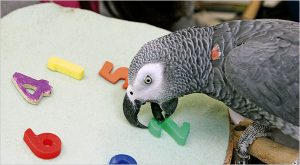 Birds make it onto all the lists of the most intelligent animals on earth—Top 25, Top 10, even Top 5. Pigeons (#19) are extremely good at geolocation and can remember places over their lifetime. Crows (#18) and ravens can solve complicated problems, recognize faces and they can hold a grudge, mobbing people who have done them harm. The ability of parrots (#4) to talk may be simple mimicry, but African Grey Parrots can count, identify shapes and colours, and learn human words. Experiments show that they understand concepts such as “zero” and ”different.”
Birds make it onto all the lists of the most intelligent animals on earth—Top 25, Top 10, even Top 5. Pigeons (#19) are extremely good at geolocation and can remember places over their lifetime. Crows (#18) and ravens can solve complicated problems, recognize faces and they can hold a grudge, mobbing people who have done them harm. The ability of parrots (#4) to talk may be simple mimicry, but African Grey Parrots can count, identify shapes and colours, and learn human words. Experiments show that they understand concepts such as “zero” and ”different.”
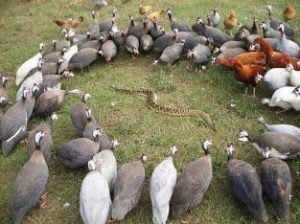 Although my husband Wayne disagrees, I’ve always believed my chickens were smart. Their social organization is sophisticated and researchers have recorded more than two dozen distinct cries. Once, when my rooster miscalculated his attack on a snake and ended up with the reptile tail in his mouth and fangs lodged in his wattles, the hens came running at his call. They took turns grabbing at the snake’s head until the fangs let loose and the rooster was able to flip the snake in the air and swallow it head-first into his crop, where the snake continued to wriggle for as along as I could bear to watch.
Although my husband Wayne disagrees, I’ve always believed my chickens were smart. Their social organization is sophisticated and researchers have recorded more than two dozen distinct cries. Once, when my rooster miscalculated his attack on a snake and ended up with the reptile tail in his mouth and fangs lodged in his wattles, the hens came running at his call. They took turns grabbing at the snake’s head until the fangs let loose and the rooster was able to flip the snake in the air and swallow it head-first into his crop, where the snake continued to wriggle for as along as I could bear to watch.
The Genius of Birds
Are these birds acting with intention, with consciousness, or is it habit, mimicry, an accidental hit on the occasional good solution?
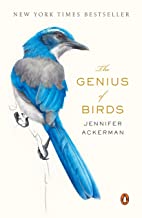
Was that Green Heron really considering its options?
According to scientists, consciousness has several levels. The lowest level is sentience—the ability to have a point of view. The next is sapience—the ability to have a train of thought and form opinions. The third and highest level is the ability to have an understanding of the self.
For humans—and we’ve admitted other primates into this exclusive club—consciousness is associated with the cerebral cortex. Birds don’t have this part of the brain. But they do have a ‘nidopallium caudolaterale’ or NCL, which routes sensory information to other parts of the body, just as the prefrontal cortex does in the primate brain.
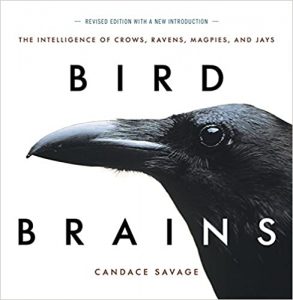
Whether scientists are studying human-sized emus or diminutive zebra finches, they’ve found that birds pack more brain cells into their tiny brain cases than mammals or even primates of a similar size. Their neurons are smaller, more numerous, more densely packed than ours and their sensory and nervous systems are more efficient. Big parrots like macaws and corvids such as ravens and crows have higher neuron counts in their forebrains than monkeys—in some cases twice as many neurons with more connections between them.
Birds may have a brain the size of a walnut, and they may have split with the human evolutionary path 320 million years ago, but scientists now believe that birds are not only clever and ingenious, they are strategic and capable of acquiring, processing, storing, and using information in different contexts. They can find patterns and make decisions, even plan for the future.
In other words, there’s a good chance that Green Heron was considering its options. And that “bird-brained” should be taken as a compliment.
Birds Have Feelings, Too
In Britain, vertebrate animals may soon be declared sentient beings in law. That includes any animal with a backbone—mammals, reptiles, amphibians, fish, and birds, too.
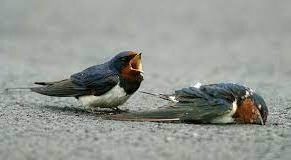 The Animal Welfare (Sentience) Bill was introduced in British Parliament two weeks ago. If passed, animal sentience will have to be considered when designing all British government policy. Agricultural policy, the rules governing factory farming for instance, will have to consider the sentience of pigs and cows and chickens, and environmental policy will have to consider the consciousness of songbirds.
The Animal Welfare (Sentience) Bill was introduced in British Parliament two weeks ago. If passed, animal sentience will have to be considered when designing all British government policy. Agricultural policy, the rules governing factory farming for instance, will have to consider the sentience of pigs and cows and chickens, and environmental policy will have to consider the consciousness of songbirds.
The bill formally recognizes that animals are sentient, Animal Welfare minister Lord Goldsmith said when he introduced the bill, “and experience feelings in the same way humans do.”
Bird Lesson #6
I appreciate birds, I feed birds, I want them near, I can’t imagine my life without them, and yet I have grossly misunderstood and underestimated them.
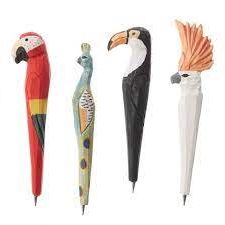 I have assumed that cleverness and its big sister, wisdom, were the exclusive purview of humans. I have assumed that because birds look different and act different, and sound different, and don’t speak my language, that they are inferior. I have assumed my human privileges are deserved, and not just an accident of nature.
I have assumed that cleverness and its big sister, wisdom, were the exclusive purview of humans. I have assumed that because birds look different and act different, and sound different, and don’t speak my language, that they are inferior. I have assumed my human privileges are deserved, and not just an accident of nature.
Anthropocentric, white-centric, norteamericano-centric, settler-centric, city-centric. Layers upon layers obscure my writer’s vision.
I watch the Green Heron allow the fish to swim away, realizing he caught more than he can chew, or maybe deciding the fish deserved to live, or maybe just too tired or bored to carry on the struggle, or maybe the bird was simply being a Green Heron, filled with no human thoughts and feelings at all.



3 Comments
This essay makes me think of my own work on the evolutionary link between dinosaurs and birds, and reminds me of the scene in Jurassic Park, when two velociraptors cooperate to hunt down the human hunter. We underestimate the intelligence of other species at our peril.
I too plead guilty to having disparaged assorted politicians and other hapless humans as “birdbrains.” Perhaps more appropriate terms should refer to inanimate objects, such as “stonebrains” or “brickbrains” Or should we try more tolerant phrases such as “behind the door when the brains were handed out?”
I vote for the man-made material—Brickbrains!